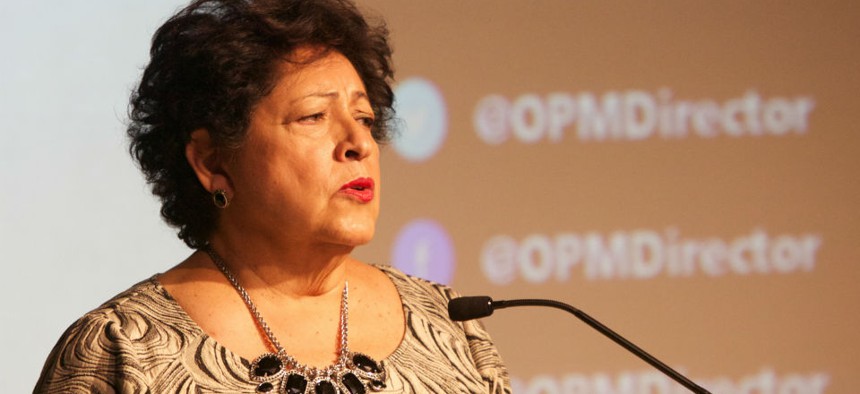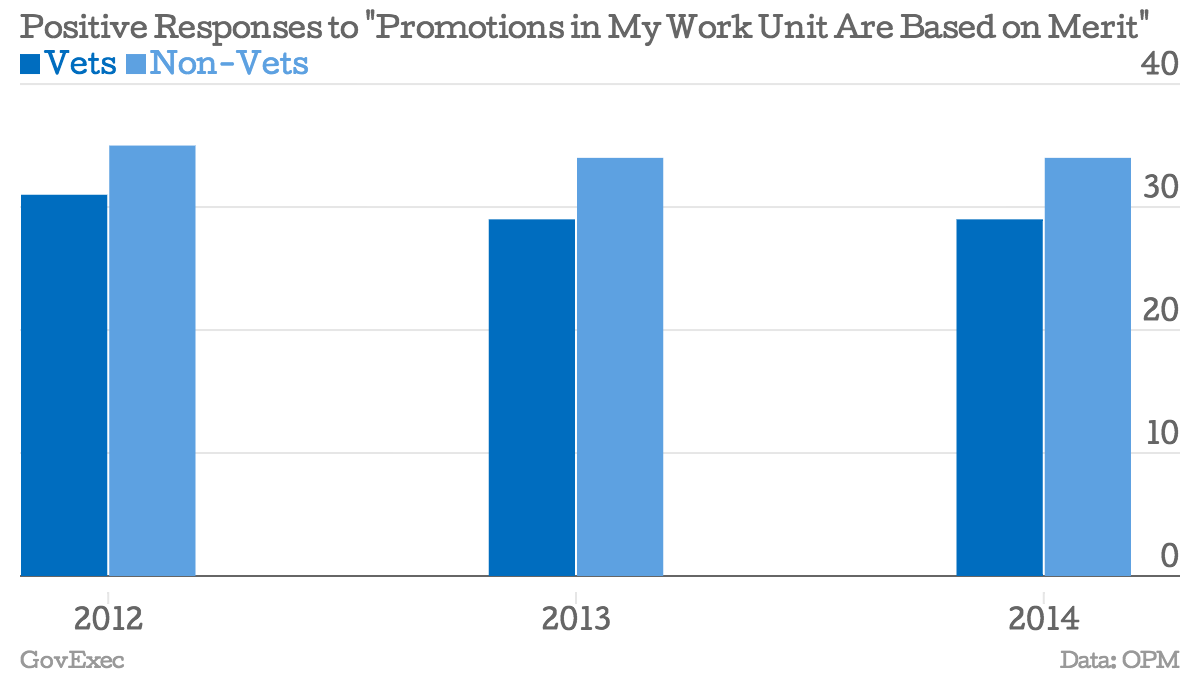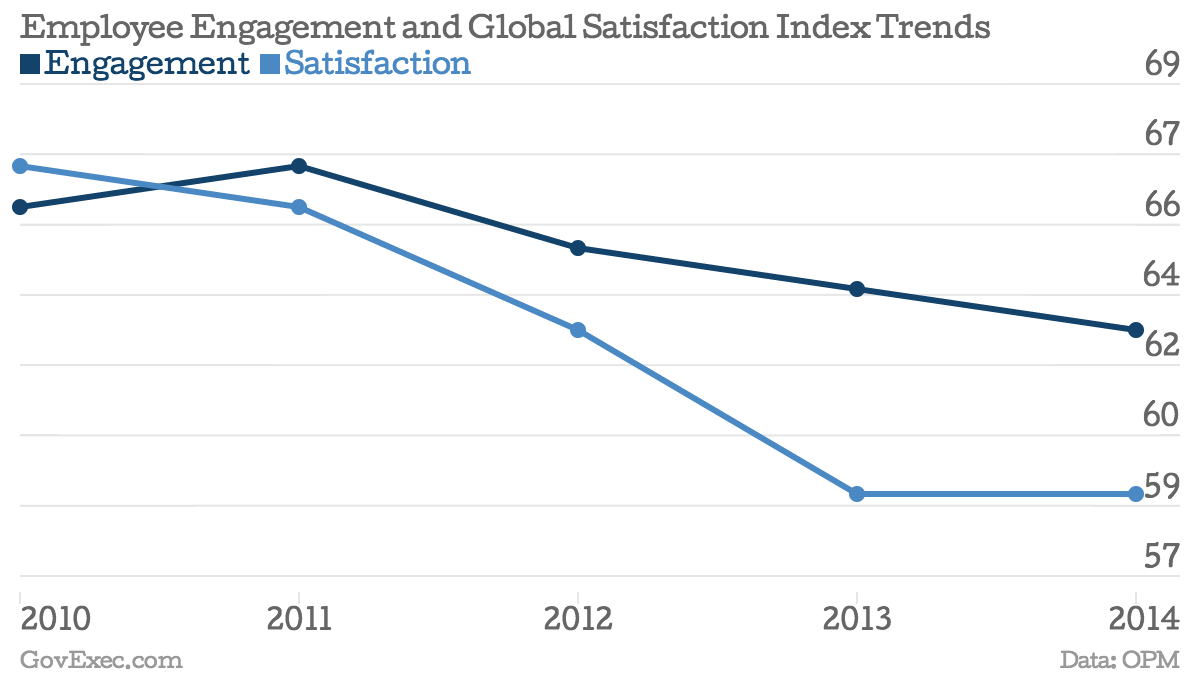
OPM Director Katherine Archuleta committed to helping agencies foster employee engagement Education Department
Vets Have Less Faith in Merit-Based Federal Promotions Than Their Peers
Annual governmentwide survey of feds shows concerns over fairness in the workplace and senior leadership.
Veterans working in the federal government have even less faith than their non-veteran peers that job promotions in their office are based on merit, according to the results of a new governmentwide survey on employee satisfaction and engagement.
Twenty-nine percent of veterans who responded to the 2014 Federal Employee Viewpoint Survey said they believed promotions were a result of job performance compared to 34 percent of non-veteran respondents. Overall, 32 percent of respondents believed promotions were rooted in fairness, the same rate as last year.

Vets also were “strikingly less positive than non-veterans on whether the survey results would be used to improve their workplace,” said the survey, which the Office of Personnel Management released on Friday morning. Thirty-four percent of veterans believed their agencies would use the feedback from employees to improve the work environment compared to 41 percent of non-veteran feds.
Of the nearly 400,000 respondents to this year’s FEVS, 28.6 percent identified themselves as veterans. Most veteran respondents were male, age 50 or older, and had worked in the federal government for six years or more. Nearly two-thirds of veteran respondents said they did not serve as supervisors in their jobs. Sixty-one percent of veteran survey respondents said supervisors in their work unit supported employee development, compared to 65 percent of non-vet respondents who felt the same way.
The Obama administration has made a big push over the past few years to hire more veterans in government; vets now make up one-third of the federal workforce. A September Washington Post story said the effort to hire more vets in federal agencies has stoked resentment in some federal offices between employees who have served in the military and those who have not. Fifty-five percent of all FEVS respondents said management supports diversity in the workforce, and 74 percent said that “supervisors value employees.” But just 43 percent said they believed “all employees are treated equitably.”
Overall, 59 percent of federal employees said they were satisfied with their jobs, pay and working environment in 2014, the same as in 2013.

Within that “global satisfaction index,” there were pockets of concern: 64 percent said they were content with their jobs, compared to 65 percent in 2013; 62 percent said they would recommend their organization as a good place to work, down from 63 percent in 2013. Satisfaction with pay, however, was up 2 percentage points from last year’s survey. Several individual agencies have released their own data over the past few weeks, reflecting the larger trends apparent in the governmentwide survey unveiled Friday.
While an overwhelming number of feds believe their work is important (90 percent) and said they put in extra effort to get their jobs done (96 percent), the survey reflects a federal workforce that does not believe their agencies offer promotions, pay raises or other opportunities fairly. Faith in senior leaders also is eroding based on the data. Fifty percent of respondents agreed with the statement, “My organization’s senior leaders maintain high standards of honesty and integrity,” down 4 percentage points from 2013 -- the largest decrease during the past year recorded among the survey’s 84 main questions.
The Senior Executives Association has criticized the use of the phrase “senior leader” in the survey, saying it is vague and respondents could interpret it to mean a political appointee, member of the Senior Executive Service, or any manager considered senior.
“The FEVS is a valuable point in time survey that should give an agency strong indicators of success or raise red flags,” SEA President Carol Bonosaro said. “But SEA cautions against using the survey as a basis for policy decisions or specific conclusions regarding groups of employees, especially regarding ‘senior leader.’ ”
OPM and SEA have worked together to try and clarify the definition of senior leader. “The results of the 2015 FEVS will provide a better gauge of the impact of the clarified leadership definitions,” the survey stated.
Bright spots included slight increases from last year related to employees’ satisfaction with their immediate supervisors, recruiting new employees with the right skills, and having enough resources to do the job. “It is encouraging to see that federal employees remained committed to their jobs regardless of the difficulties our workforce has faced in the last few years,” said OPM Director Katherine Archuleta. “OPM is committed to helping all federal agencies to implement agency-specific programs that will continue to foster employee engagement and better serve the American people.”
Among other things, the agency has created an internal dashboard of survey data – Unlocktalent.gov -- for federal managers to help them drill down into the results from their agencies to improve where needed.
Still, federal employee unions said the results of the 2014 survey show morale among federal workers continues to drop.
“There are four things that must be done to improve morale and stop this continuing slide we see year after year,” said J. David Cox Sr., president of the American Federation of Government Employees. “Close the gap between federal salaries and salaries paid to people doing the same jobs in the private sector, restore retirement benefits, stop shifting health care costs onto workers, and bargain good contracts.”
National Treasury Employees Union President Colleen Kelley said the survey results should serve as a wake-up call not just for federal managers but for Congress too. “Morale will take another hit if Congress fails to agree on a new budget once the current stopgap measure expires,” she said, referring to the continuing resolution that runs out on Dec. 11. “We urge Congress to pass a new funding bill that provides employees with the resources necessary to accomplish the critical missions of their agencies.”
Ross Gianfortune contributed to this report.







